
JOURNAL OF THE EUROPEAN MATHEMATICAL SOCIETY
Scope & Guideline
Elevating Standards in Mathematical Scholarship
Introduction
Aims and Scopes
- Algebraic Geometry and Number Theory:
Research in this area includes the study of algebraic varieties, schemes, and their properties, as well as connections to number theory, such as L-functions and the arithmetic of algebraic varieties. - Geometric Analysis and Differential Geometry:
This scope focuses on the geometric properties of spaces and manifolds, including curvature, topology, and the analysis of geometric flows, often utilizing tools from differential equations. - Representation Theory and Algebra:
The journal features research on representation theory of algebraic structures, including groups and algebras, and their applications to geometry and number theory. - Mathematical Physics:
Papers in this category explore the mathematical foundations of physical theories, including quantum mechanics and general relativity, often through the lens of differential equations and geometric structures. - Probability and Stochastic Processes:
This area covers the mathematical theory of probability, stochastic processes, and their applications, particularly in statistical mechanics and random phenomena. - Topology and Homotopy Theory:
Research related to topological spaces, homotopy theory, and their implications in various mathematical contexts, including algebraic topology and geometric topology. - Functional Analysis and Operator Theory:
This includes studies on the properties of functions and operators, particularly in infinite-dimensional spaces, and their applications in various mathematical and physical contexts.
Trending and Emerging
- Nonlinear Dynamics and Partial Differential Equations:
There is a growing interest in the study of nonlinear phenomena and their mathematical modeling through partial differential equations, particularly in the context of fluid dynamics and wave equations. - Algebraic Geometry over Finite Fields:
Research focusing on algebraic geometry in the context of finite fields is emerging, driven by its applications in coding theory and cryptography. - Machine Learning and Data Analysis:
The integration of mathematical techniques with machine learning and data analysis is increasingly prevalent, with papers exploring mathematical foundations and methodologies for data-driven approaches. - Topological Data Analysis and Applications:
This area is gaining attention as researchers apply topological methods to analyze complex data structures, revealing insights in various fields, including biology and social sciences. - Quantum Mathematics and Information Theory:
Emerging themes in quantum mathematics and its intersection with information theory reflect the growing relevance of quantum technologies and their mathematical underpinnings.
Declining or Waning
- Classical Analysis and Complex Variables:
There has been a decrease in papers specifically focused on classical analysis and complex variables, as newer areas and interdisciplinary approaches gain prominence. - Discrete Mathematics and Combinatorics:
Research related to discrete structures and combinatorial methods appears to be waning, possibly due to a shift towards more analytical and geometric approaches in recent publications. - Mathematical Logic and Foundations:
The focus on foundational aspects of mathematics, including mathematical logic, set theory, and model theory, has diminished, reflecting a broader trend in the mathematical community towards applied and geometrically motivated research.
Similar Journals
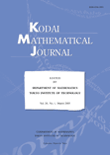
Kodai Mathematical Journal
Illuminating the Path of Mathematical DiscoveryKodai Mathematical Journal is a distinguished publication dedicated to advancing the field of mathematics, particularly in miscellaneous areas. Established in 1949, this esteemed journal has been a reputable source for researchers and practitioners who seek to contribute to the rich landscape of mathematical knowledge. Published by KINOKUNIYA CO LTD, the journal is based in the academic environment of Tokyo Institute of Technology and serves a global audience with rigorous and insightful research articles. Despite its current Q3 quartile ranking in the Scopus Mathematics category, which reflects its niche but impactful contributions, the journal is poised for growth; the convergence of traditional and novel mathematical techniques promises to enhance its relevance further. Researchers, professionals, and students are encouraged to engage with the rich content of the journal, aimed at fostering collaboration and nurturing innovation in the mathematical community. While currently not available as Open Access, Kodai Mathematical Journal remains a critical resource for those passionate about mathematics and its applications.
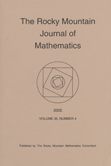
ROCKY MOUNTAIN JOURNAL OF MATHEMATICS
Fostering Collaboration in Diverse Mathematical FieldsROCKY MOUNTAIN JOURNAL OF MATHEMATICS, published by the Rocky Mountain Math Consortium, serves as a critical platform for researchers and practitioners in the field of mathematics since its inception in 1971. With a notable presence in the academic community, this journal covers a broad spectrum of mathematical disciplines, positioning itself in the Q2 category for Mathematics (miscellaneous) as of 2023. Despite being a subscription-based journal, it is recognized for its rigorous peer-review process and contributions to theoretical and applied mathematics, helping to advance knowledge and foster collaboration among mathematicians. The journal's ISSN number is 0035-7596 and its E-ISSN is 1945-3795, reflecting its commitment to accessibility and dissemination of high-quality research. Based in Tempe, Arizona, at Arizona State University, the journal continues to play an important role in shaping contemporary mathematical discourse through well-researched articles and innovative studies, aiming to bridge gaps between various mathematical subfields and engage a diverse audience, including students and established researchers alike.

Mediterranean Journal of Mathematics
Pioneering New Paths in Mathematics Since 2004The Mediterranean Journal of Mathematics, published by SPRINGER BASEL AG, is a prominent platform dedicated to the advancement of mathematical research and education. Since its inception in 2004, this journal has been pivotal in disseminating high-quality research across various fields of mathematics, currently holding a notable Q2 ranking in the miscellaneous mathematics category as of 2023. With its ISSN 1660-5446 and E-ISSN 1660-5454, the journal enjoys a respected position in the academic community, evident by its Scopus rank of 129 out of 399 in General Mathematics, placing it in the 67th percentile. While primarily a subscription-based journal, it remains committed to providing a comprehensive resource for researchers, professionals, and students, fostering dialogue and exploration within the mathematical sciences. The Mediterranean Journal of Mathematics, based in Basel, Switzerland, continues to contribute significantly to the evolution of mathematical theory and practice, marking its relevance as we approach its 20th anniversary in 2024.
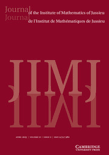
Journal of the Institute of Mathematics of Jussieu
Uniting Global Minds in the Pursuit of Mathematical ExcellenceJournal of the Institute of Mathematics of Jussieu, published by Cambridge University Press, is a leading academic journal that has established itself as a vital resource in the field of mathematics. With an impressive impact factor and a ranking in the top quartile (Q1) of miscellaneous mathematics, the journal serves as a platform for high-quality research from both established scholars and emerging researchers. Spanning from 2002 to 2024, the journal aims to foster collaboration and innovation in the mathematical community by publishing original research articles, reviews, and critical discussions on a wide range of mathematical topics. Although the journal does not offer open access, it remains widely accessible through various academic institutions and libraries, ensuring that critical advancements in mathematics are shared with a global audience. Located in the United Kingdom at the prestigious Cambridge campus, the journal reflects the rigorous standards of its publisher and the rich academic tradition of its home institution.
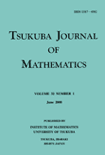
Tsukuba Journal of Mathematics
Empowering Mathematicians to Share Transformative IdeasTsukuba Journal of Mathematics is a distinguished publication dedicated to advancing the field of mathematics through the dissemination of innovative research and comprehensive studies. Published by the University of Tsukuba, Department of Mathematics, this journal serves as a vital platform for mathematicians, researchers, and students to engage with cutting-edge mathematical theories and methodologies. Although currently not available as an open-access journal, it maintains a strong academic presence, contributing significantly to the global mathematical landscape. The journal invites submissions across various branches of mathematics, aiming to foster scholarly communication and collaboration. The ISSN 0387-4982 and the E-ISSN 2423-821X further establish its credibility and accessibility among the academic community, supporting its critical objective of facilitating high-quality research output. Situated in Tsukuba, Japan, a hub for scientific research and development, the Tsukuba Journal of Mathematics is committed to bridging gaps in mathematical knowledge and encouraging exploration of novel ideas.
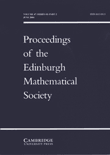
PROCEEDINGS OF THE EDINBURGH MATHEMATICAL SOCIETY
Pioneering original research in mathematics.PROCEEDINGS OF THE EDINBURGH MATHEMATICAL SOCIETY, published by Cambridge University Press, stands as a cornerstone within the realm of mathematical research, providing a platform for original papers that push the boundaries of various mathematical disciplines. With a rich history dating back to 1883, this journal has evolved through several converged years, reflecting the dynamic nature of mathematical inquiry. As a Q2 category journal in the field of Mathematics (miscellaneous) according to the latest rankings, it situates itself within the upper tier of academic publications, offering an essential resource for researchers and professionals alike. While it currently does not offer open access options, the journal's contributions are invaluable, facilitating dialogue and collaboration among scholars. The journal's commitment to advancing mathematical knowledge makes it a vital publication for those engaged in the study and application of mathematical theories and principles.

Pure and Applied Mathematics Quarterly
Fostering Innovation in Mathematical DisciplinesPure and Applied Mathematics Quarterly is a prestigious journal published by INT PRESS BOSTON, INC, focusing on the diverse and evolving field of mathematics. Since its inception in 2007, this journal has grown significantly, currently holding a Q1 ranking in the Mathematics (Miscellaneous) category for 2023, positioning it among the leading publications in the discipline. With a commitment to publishing high-quality research, Pure and Applied Mathematics Quarterly fosters innovation and dialogue within the mathematical community by providing a platform for theoretical advancements and practical applications. The journal remains accessible to researchers and professionals through its ISSN 1558-8599 and E-ISSN 1558-8602, although it does not currently offer open access. As a vital resource for mathematicians, educators, and students, this journal endeavors to expand the frontiers of mathematical knowledge and contribute to the academic dialogue surrounding this fundamental science.
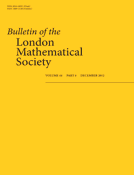
BULLETIN OF THE LONDON MATHEMATICAL SOCIETY
Empowering the Mathematical Community with Quality ResearchThe BULLETIN OF THE LONDON MATHEMATICAL SOCIETY, published by Wiley, is a distinguished journal that serves as a vital resource in the field of mathematics. With its ISSN 0024-6093 and E-ISSN 1469-2120, this journal has consistently provided a platform for innovative research and scholarly discourse since its inception in 1969. Recognized for its quality, it currently holds an impressive Q1 ranking in the mathematics category, a testament to its significance in disseminating influential findings and trends in the mathematical sciences. Researchers and practitioners can rely on the BULLETIN for its comprehensive coverage of both theoretical and applied mathematics, which caters to a diverse audience ranging from professionals to students alike. Though it does not currently offer Open Access options, its articles can be accessed through institutional subscriptions, ensuring that significant works reach the academic community effectively. With contributions that span over five decades, the journal continues to shape mathematical research and inspire future advancements in the discipline.

PUBLICATIONES MATHEMATICAE DEBRECEN
Unveiling New Perspectives in MathematicsPublicationes Mathematicae Debrecen is a renowned international journal published by the University of Debrecen, Institute of Mathematics, situated in Hungary. This journal, with both ISSN 0033-3883 and E-ISSN 2064-2849, has established itself in the field of mathematics since its inception, with coverage extending from 1997 to 2024. Recognized for its rigorous academic standards, it currently holds a Q3 ranking in the mathematics (miscellaneous) category for 2023 and ranks at the 42nd percentile among general mathematics journals in Scopus. Publicationes Mathematicae Debrecen aims to disseminate high-quality research across various areas of mathematics, contributing to the advancement of knowledge and practice in this dynamic field. Although it is not an open-access journal, its readers can access a wealth of scholarly work that addresses both theoretical and applied mathematical issues, making it an invaluable resource for researchers, professionals, and students alike.
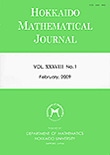
Hokkaido Mathematical Journal
Connecting theory and application in the realm of mathematics.Hokkaido Mathematical Journal, published by Hokkaido University, Department of Mathematics, stands as a pivotal platform for scholarly discourse in the field of mathematics. Established in 1972, this peer-reviewed journal has consistently contributed to the advancement of mathematical research, covering a wide spectrum of topics within the discipline. With its current ranking in the third quartile (Q3) among miscellaneous mathematics journals, it offers valuable insights and findings that cater to both established researchers and budding mathematicians alike. The journal is accessible through traditional subscription, fostering a community that values rigorous theoretical exploration and applied mathematical methods. As it approaches its convergence year in 2024, Hokkaido Mathematical Journal remains essential for those dedicated to pushing the boundaries of mathematical knowledge and innovation in Japan and beyond.